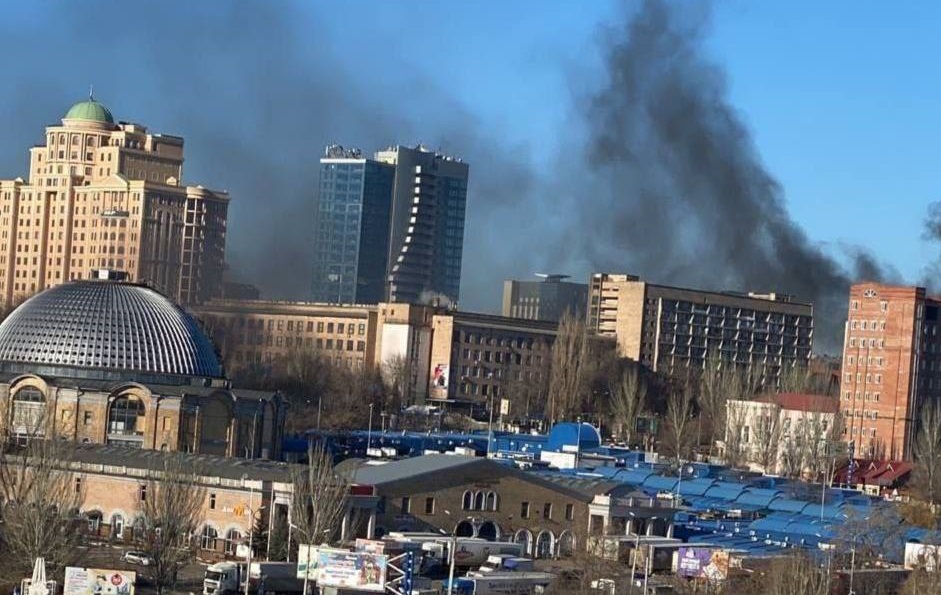
The Ukrainian authorities (or rather, the Ukrainian military) currently control only a small patch of territory in the Luhansk oblast, specifically in the Svatove and Sievierodonetsk districts. Back in November 2023, OstroV reported that Ukraine controlled 15–16 settlements in the region, about 5% of its total territory, but now that number is even smaller. Not even the military can say for sure exactly how much. Beyond that is an active combat zone, and further still lies the occupied territory.
As of September 16, 2024, only two villages remain under Ukrainian control where civilians still live—Nevske and Novolyubivka—with a total of just 20 people. Hrekivka has been abandoned after its last remaining resident, 82-year-old Nadiia Yemelianivna Myroshnychenko, went missing in April this year (details below). The last three residents of Makiivka left on July 25, as reported by OstroV.
All of the aforementioned villages are part of the Krasnorichenske community in the Svatove district. Krasnorichenske Community Military Administration has been the only administration in the Luhansk oblast for more than two years that not only assists displaced people, prepares for de-occupation, and maintains its personnel, but also works with actual territory still under Ukrainian control. Currently, only representatives of the administration travel to this area to help local residents.
Administrative details: a small settlement community divided by the frontline
The Krasnorichenske settlement community in the Svatove district was established during the administrative reform in July 2017. It includes settlements from the former Krasnorichenske, Baranykivka, and Novooleksandrivka councils of the former Kreminna district. The community covers an area of just under 245 square kilometers, which is slightly smaller than Luhansk, occupied since 2014 (Luhansk covers 257 square kilometers).
The administrative center of the community, the village of Krasnorichenske, has been under occupation since March 2022. The aforementioned villages of Makiivka, Nevske, Hrekivka, and Novoliubivka were de-occupied in the fall of 2022 during the Kharkiv counteroffensive. However, they have been under almost constant shelling by the occupiers and are gradually emptying due to the deaths and evacuation of residents. The remaining settlements in the community are regularly mentioned in military reports as areas where active combat is taking place.
As of October 29, 2017, according to the Krasnorichenske Community Military Administration website, the community had a population of 6,724. It’s difficult to say how many remain now, especially considering those still living in the occupied administrative center. Only for the villages under Ukrainian control, the Krasnorechenske CMA staff can provide an exact number. The population has long since dwindled, no longer counted in the hundreds, or even tens, as it was just a few months ago.
"Right now, we have 20 people living here", - Krasnorichenske administration head Mykhailo Khutoriansky told OstroV.
There are 17 residents left in Nevske and three in Novolyubivka.


The villages where people remain are almost entirely in ruins
For the remaining residents, whose numbers are dwindling, bread, other food items, medicine, and cooking gas cylinders are brought in. When necessary, they are taken to towns in the Donetsk oblast for social or pension services (the nearest settlement with most signs of civilization is Lyman, in the Donetsk oblast). Those who wish to evacuate are taken out, while others are urged to leave. There have been attempts to organize celebrations or at least acknowledge holidays, though these efforts have ceased. Under the constant drone attacks, it has become impossible.
One of the rare occasions when a holiday led to a visit from the administration was Easter in May 2024
Staff: a combat officer, a village head serving two terms, and a village head who has been imprisoned by russians
Mykhailo Khutoriansky was appointed head of the Krasnorichenske Community Military Administration in April 2024. He is a professional soldier and an experienced combat officer originally from the Cherkasy oblast. He has served in various units of the border service across Ukraine, from Chop to Crimea and Luhansk. After 2014, he served in a border unit responsible for the Luhansk oblast. When the full-scale russian invasion began, he was serving in a marine guard unit based in Izmail, the Odesa oblast (Mykhailo holds the rank of second-rank captain). Much of his combat experience cannot be publicly discussed, though it’s worth noting that he took part in the liberation of Zmiinyi Island.
Before assuming his current position, Khutoriansky briefly worked as the deputy head of the Chmyrivka village administration in the Starobilsk district, the Luhansk oblast. He says he finds his current role in Krasnorichenske more interesting, as it is unique—being the only administration in Luhansk that controls a territory still inhabited by civilians.
"I have great respect for the work of other military administrations. I know they are doing important and difficult work. It's just that, personally, as a military man, I feel more comfortable and engaged here. This is hands-on work... There are people, there’s territory...", - says Khutoryansky, admitting that here he feels much more in his element than in a purely 'office-based' position.
He is one of the few who continues to visit the villages of the Krasnorichenske community.

Mykhailo Khutoryansky
According to the official staff roster, the Krasnorichenske Community Military Administration has 34 positions. Currently, there are 19 employees, and according to the head, this is quite enough to handle the work.
"We try to hire displaced persons because they have difficulty finding work", - says Mykhailo. "Right now, we are hiring a war veteran for one of the positions".
The legal address of the administration remains in Krasnorichenske itself. After the creation of the CMA, its actual office was initially set in the Lviv oblast. Now, it has been moved to the Kyiv oblast, where Khutoriansky spends half of his time. The other half he spends in the city of Sloviansk, to make it easier and closer to reach the de-occupied settlements of the Luhansk oblast. His deputy, Viktor Zozulia, also now lives in Sloviansk.
Viktor Zozulia is a completely local figure in the Krasnorichenske community. He lived in his native village of Nevske until the end of July this year when his home was destroyed by yet another russian shelling.
"I lived in my kitchen for about three more days and eventually left for Sloviansk", - says Zozulia.
Every time there's news that bread, medicine, or repair materials were brought to the villages of the Luhansk oblast, it means Zozulia personally went to each yard to provide help. He traveled through the villages while living in Nevske, and now he does it from Sloviansk.

Viktor Zozulia (pictured on the right) during the evacuation of fellow villagers on September 30
 Viktor Zozulia lived in his native Nevske until the russians destroyed his home
Viktor Zozulia lived in his native Nevske until the russians destroyed his home
"When Nevske was liberated in 2022, there were 159 of us left here", - recalls Viktor Zozulia, who has been serving as the deputy head of the Krasnorichenske CMA for more than two years. "Back then, our motivation was to keep our village alive and for people to return. Now, with only 20 people left in the community, it's the desire to support those who remain... To make them feel that the state, Ukraine, is with them, supporting and helping them".
Zozulia was the village head of Nevske for two terms. His fellow villagers first elected him in 2011. At the time, Viktor was 37 years old (he's now 50) and worked as an ambulance driver. Before that, by degree, he worked as an agronomist at a local farm.
In 2019, the village council in Nevske was reformed, and the state appointed him as the head—thus beginning a third term.
The full-scale invasion and occupation of the village (which happened very quickly) found Viktor still serving as the village head. After the village was liberated in the fall of 2022—right when the Krasnorichenske CMA was established, replacing the village council—Zozulia accepted the offer to become deputy head. He evacuated his loved ones from Nevske ("Because it freed my hands and made it easier to work", - he says) and stayed to live and work in his village.
The local village head, Halyna Hlobchasta, lived in another de-occupied village of the community—Makiivka, which is now completely abandoned. During the occupation, she survived russian imprisonment where she was tortured with electric shocks, among other methods. Later, she and her husband managed to escape on foot to the liberated Kharkiv oblast, leaving her elderly deaf mother behind in the village.
"When the village was de-occupied, I came back and realized that living at home was no longer possible", - says Halyna. All this time, she has lived and worked in relocation, just like all the officials from the Luhansk oblast, except for Zozulia.
"The last time I was in our villages was on April 15. I went with Zozulia", - Hlobchasta recounts. "It was then that we discovered that Nadiia Myroshnychenko had disappeared..."
She goes on to tell the story of 82-year-old Nadiia Myroshnychenko, who had been living alone for a long time in Hrekivka.
Goats, beehives, potatoes in a cart, and her son's DNA—with hope for a possible investigation 
The last footage of Nadiia Myroshnychenko was shot by a journalist from Luhansk, Anastasiia Volkova, on March 29 of this year. Soon after, Anastasiia tragically died in a car accident in Sloviansk
There are many such stories here. We'll share just one for now, as briefly as possible.
Nadiia Yemelianivna Myroshnychenko had made the news as a person living alone in the village. The last time journalists visited her was on March 29, 2024. She stubbornly refused to leave and relocate to Kharkiv, where her son resided. She continued living the life she loved.
On that April day, Zozulia and Hlobchasta brought bread to their fellow villagers. When they arrived at Myroshnychenko’s yard, they saw the same loaf of bread left on the bench near the fence, the one the soldiers had delivered a few days earlier. They called out to her... They entered the yard and saw that the house was locked, but the latch outside was not fastened. They climbed in through a window.
"We thought she was inside", - says Halyna. "But the house was tidy, clean, cozy... and empty".
They heard goats bleating in the shed, so they let them out. Nearby, they saw a cart with seed potatoes lying in it.
"She was preparing to plant her kitchen garden", - Halyna explains. "And she had a couple of beehives as well".
They spoke with the soldiers, who mentioned they hadn't seen Nadiia Myroshnychenko in a few days. They searched as best they could.
"But then the greenery grew rapidly, everything became covered in grass and leaves... It became dangerous to search because there were explosives everywhere, hidden by the growing vegetation", - says Zozulia.
The staff of Krasnorichenska CMA filed the necessary paperwork, and 82-year-old Myroshnychenko is legally considered missing. Her son submitted DNA samples for testing, and an investigation is underway.
The main theory, according to the CMA, is that the woman likely went looking for a place with mobile signal to call her son (there was no phone found in her house, so she probably took it with her). She most likely triggered an explosive device, and wild animals scattered her remains.
The goats that Hlobchasta and Zozulia had freed also later triggered explosives. Here, unfortunately, this is just the way things are.

Halyna Hlobchasta in peacetime
***
It is precisely these people and this land (although primarily the Ukrainian military, of course) that sustain the narrative: the russian occupiers never managed to reach the administrative borders of the Luhansk oblast.
By Yuliia Sabaieva, OstroV




